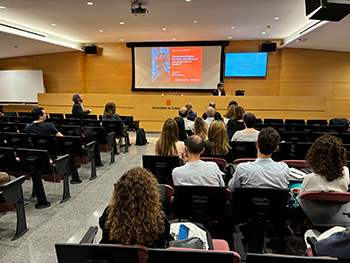
The Catalan Data Protection Authority (APDCAT) and the School of Public Administration of Catalonia (EAPC) have organized a day of debate around the risks of using neurotechnologies capable of monitoring brain activity, in the framework of the closing ceremony of the specialized training course for data protection officers (DPO) 2024.
Neurotechnologies allow meddling into people's minds beyond their own consciousness. It includes accessing both personal data and your brain activity, 95% of which is in the unconscious sphere. It is an expanding market, which is expected to reach 6.2 billion dollars in 2030 on a global scale.
For the expert Ignasi Beltran de Heredia, professor of Labor Law and Social Security at the UOC, we must begin to worry about preserving the "unconscious self" in the face of the possibility offered by these technologies to decode mental processes that do not they are not aware of the person himself. Beltran de Heredia has defended that these technologies make great therapeutic advances possible, but he has also warned that there is a market sector more intended for consumption, with devices capable of controlling concentration levels, detecting micro-sounds...
The risk lies in the fact that there may be companies interested in analyzing mental behavior, conscious or unconscious, and inferring mental states in people, anticipating what they want, predicting what they need. This is an intrusion that, given its depth, could be described as "definitive", and for this reason it is necessary to create a protective shield against the potential of this technology to condition our behavior, the expert maintains. In this regard, he spoke about the right to data protection and its ability to protect us against these risks, as well as other rights. Thus, he has defended that it is necessary to protect mental states, and data protection is a first step to preserve this very intimate part.
Massive and automated data processing
Prior to the intervention of Ignasi Beltran de Heredia, the director of the EAPC, Ismael Peña-López, welcomed this session. Peña-López has defended that "in a few years, the debate on personal data has overcome the economy-privacy axis to fully enter the field of fundamental rights and free will". He added that “without effective control over the massive and automated processing of data, we may have doubts about our own freedom of choice or the rationality of our behavior. This has a huge impact on key concepts such as identity, socialization or personal and collective autonomy and sovereignty itself."
Training to develop skills and improve knowledge
For her part, the director of the APDCAT, Meritxell Borràs, was in charge of closing the day. During his speech, he recalled the need to respond to each of the challenges that arise in the defense of the right to data protection, both from the Authority and also from the DPO that ensure compliance with the rule in organizations.
He added that the work of the DPO requires a permanent update of knowledge, but also an ability to adapt to new legal and technological contexts. In this regard, he spoke of the growing importance of artificial intelligence (AI) in our society, and added that the approval of the European AI Regulation presents us with new challenges. In addition, he highlighted the commitment and support from the Authority to DPO in terms of training and consultation also on AI, in order to clarify doubts about interpretation and implementation in relation to this matter in accordance with the new Regulation european
Fourth edition of the DPO Course
Borràs has also handed out certificates to DPO who have passed the fourth edition of the specialized course organized jointly with the EAPC. It is a training course that allows people who act as DPD in entities and bodies of the Catalan public sector to develop the skills and acquire the necessary knowledge to carry out their functions optimally.
This year the course has been intended for the technical staff of the public sector and the departments of the Generalitat de Catalunya, the staff of statutory or independent Catalan bodies and Catalan universities, as well as the staff of local entities and the local public sector.
The program is divided into 25 different units, and 180 teaching hours, to deepen aspects such as the principles of data protection, the rights of interested persons, transparency and the right to information, the approach to risk in a data processing and impact assessment, among other issues.
As part of the conclusion of the 2024 specialized training course for data protection officers, the APDCAT and the EAPC have organized a conference to discuss the possible impacts of the use of neurodata




 Contact
Contact

